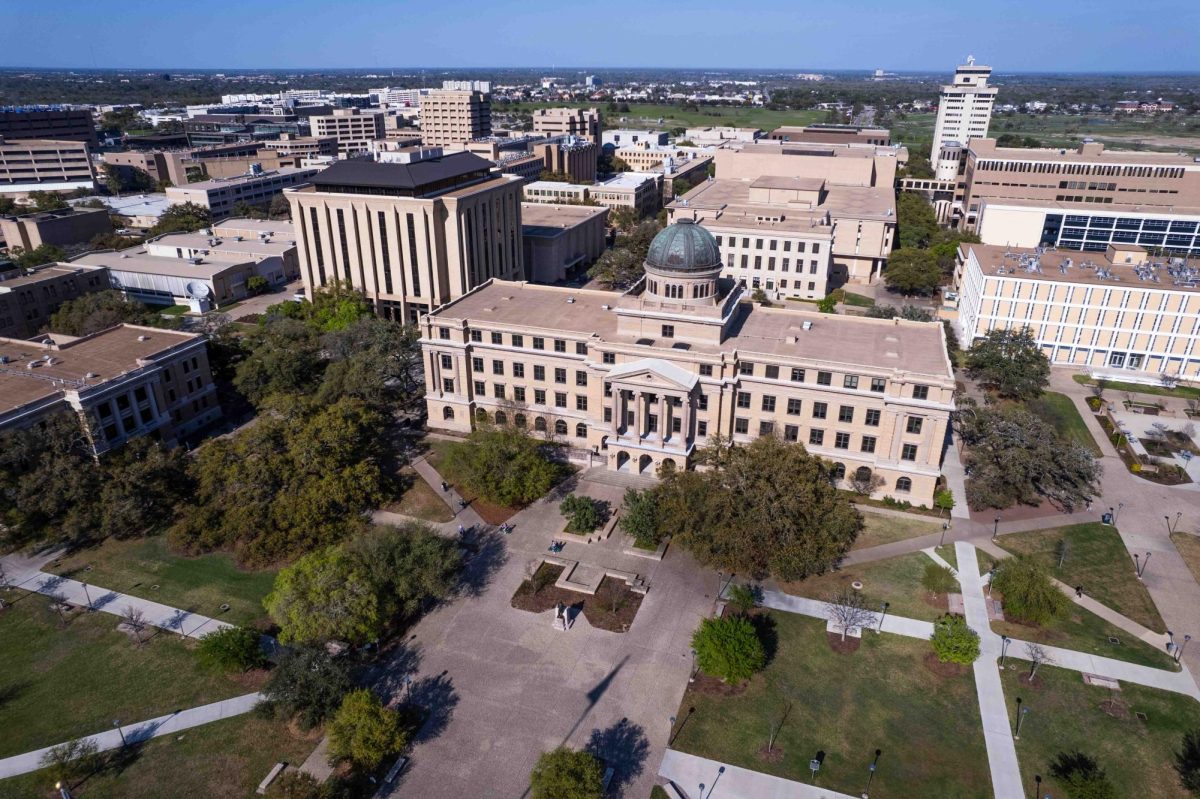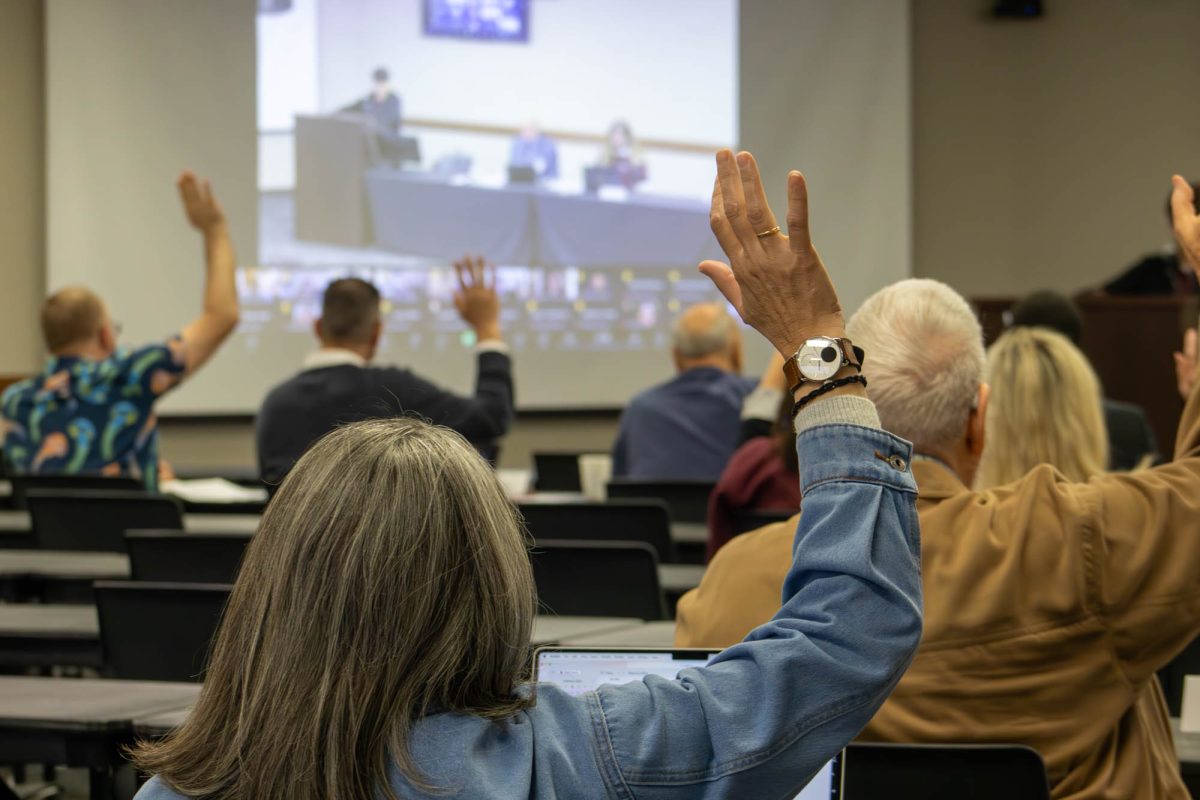The following details and events were constructed from multiple interviews conducted in September 2024. Some were on the record while others were on background. Details were supplemented with information obtained from Public Information Act requests or public sources. A&M faculty, staff, students and community members were granted optional anonymity to discuss sensitive topics.
Christian Brannstrom walked into the room with an unprecedented announcement.
Around him sat roughly 20 committee members from the Undergraduate Instruction Committee, a group meant to oversee undergraduate curricular changes and maintain communication with the senior associate dean for undergraduate education.
That dean, Brannstrom, told the sitting members that the provost was shutting down dozens of minors and certificates. There was no debate — “a decision made by the provost himself,” one attendee said.
Questions followed. Committee members argued against what they saw as a degradation of shared governance, the concept that faculty had a strong say in the university’s proceedings. But there were no other routes, according to Brannstrom. The Battalion verified documents confirming that the provost’s office required minors and certificates to begin the inactivation process by Friday, Sept. 20, a day after the meeting. Multiple advisors were notified to stop accepting students into the programs before then.
Provost and Executive Vice President Alan Sams, spearheading the inactivations, said the programs were ending due to low enrollment and graduate numbers. An A&M spokesperson said 52 programs — 14 minors and 38 certificates — are set to end. The full list, according to a spokesperson, will not be publicly available until it appears before the Faculty Senate. Sams provided a statement to The Battalion expanding on the reasoning behind the inactivations.
“This entire effort stems from the fact we created and are currently maintaining programs for which there is little to no demand,” Sams said. “Faculty engagement is built into the full review process for creation, changes and inactivation, which all of these minors and certificates will move through in the coming weeks. This full review process is a key element of shared governance. As we move forward, we are committed to developing and maintaining credentials of value to our students, and establishing and enforcing thresholds for low-producing minors and certificates is one step in that process.”
The process required faculty at the departmental level to begin the process, so the provost’s office passed the order onto the colleges, who then passed it down to the impacted departments. Yet for most faculty, confusion reigned. Established norms dictated that inactivations of minors and certificates were proposed solely by departments, a guideline all had previously followed, including Sams — who said such changes were not under his purview in a Feb. 15 article from The Daily Caller.
When responding to a Republican lawmaker criticizing the LGBTQ studies minor, Sams is quoted to have said the “authority to do something like this would have had to come from the senior ranks of [Texas A&M].” A university statement said nothing could be done because “no faculty” had requested the change.
Yet these inactivations, just months later, suggest that stance has changed.
A tumultuous year
According to a statement provided by an A&M spokesperson, the metrics used to inactivate the minors began development last year. While the Texas Higher Education Coordinating Board sets required enrollment and graduation thresholds for majors — each must award five degrees per academic year and at least 25 degrees in five years — no state-mandated process exists for minors or certificates.
“In June 2023, inquiries around the LGBTQ minor that had only a few enrolled students prompted the university to examine its programs and identify 70 certificates and minors that had no or very few graduates or enrollees,” the statement reads.
The exact inquiries were not explained by the spokesperson. However, on June 27, 2023, conservative outlet Texas Scorecard published an article claiming that “taxpayer-funded colleges are promoting LGBT ideologies,” specifically citing A&M’s LGBTQ studies minor. Other Scorecard articles preceded the end of gender-affirming care at A&M, the failed hiring of Kathleen McElroy and the suspension of the A&M System’s Title IX director.
Scorecard is the former outlet of Empower Texans, a now-dissolved Republican nonprofit with an associated political action committee. It spun off into an independent outlet in 2020 published by Michael Quinn Sullivan, an A&M Class of 1992 graduate who has been described as a “hardline conservative activist.” Scorecard is funded and chaired by oil billionaire Tim Dunn, one of the largest and most influential conservative donors in Texas.
The outlet frequently discusses programs, professors and staff it considers going against A&M’s status as a “conservative stalwart.”
A Texas Public Information Act, or PIA, request from The Battalion uncovered three Scorecard PIA requests made on Jan. 24 and Jan. 29. A Scorecard writer aimed to learn state funding numbers for various COMM, WGST and ANTH courses, the results of a Los Alamos National Laboratory fellowship and the number of graduates and enrolled students in several minors and certificates, including the LGBTQ studies minor. The information acquired spurred another Scorecard article, one of multiple targeting the minor in 2024 alone.
According to an internal review, Scorecard’s June 15, 2023 article criticizing the hiring of McElroy as journalism director “generated numerous calls and emails to the President’s Office” at A&M. Former President M. Katherine Banks recalled receiving calls from six to seven members of the Board of Regents “asking questions and raising concerns” about the hiring. It’s unclear whether the June 27, 2023 article criticizing the LGBTQ studies minor generated a similar response.
After the review established other programs with low enrollment, the Office of the Provost began work in August 2023 to set thresholds for “low-producing” programs. Sams worked with the Council of Deans, a group of deans presiding over A&M’s various colleges and schools, to create the thresholds, and a subcommittee was charged with shaping the process.
The subcommittee was headed by Debbie Thomas, associate provost and the dean of the College of Marine Sciences and Maritime Studies in Galveston. Thomas did not respond in time for publication.
According to an A&M spokesperson, the thresholds for both minors and undergraduate certificates are 10 graduating students in the last two years or a minimum current-year enrollment of five students. For graduate certificates, the threshold is six graduates in the last two years or a minimum enrollment of three students.
The spokesperson noted all enrolled students — which is on average less than one student per certificate and 1.2 per minor — can complete the program if currently enrolled. A&M plans to repeat the inactivation process annually during the Texas Higher Education Coordinating Board’s productivity review for majors.
“Further, the courses associated with these certificates and minors are unaffected as they serve other degree program requirements,” the statement reads.
The process continued into the spring of 2024 and was discussed with the University Distinguished Professors and the Steering Committee of the Department Head Council, according to a separate statement.
In February, Texas Rep. Chip Roy and State Rep. Brian Harrison criticized the LGBTQ studies minor and called for its removal. Roy said A&M needed to be “held accountable” for its “radical woke policies.”
Harrison reached out to various A&M officials demanding answers, including Sams. His response and a university statement were detailed in a Feb. 15 article.
The Feb. 15 article similarly confirms that the process was underway prior to the Republican politicians’ comments.
“Texas A&M University is going above state requirements and developing a process to include the university’s 156 minors in a similar review,” a February statement to The Daily Caller said. “This minor will be part of that review process.”
Harrison continued criticizing the minor on X, formerly known as Twitter, until the inactivations were first reported by The Battalion on Sept. 26. He claimed partial credit, posting that he was “pleased to learn from Chancellor [John] Sharp they plan to end it” and “proud to have helped deliver this victory for Texas taxpayers.”
An A&M System spokesperson said when Harrison asked Sharp about the minor, Sharp “checked with the university and was told it was on the list of minors scheduled to be eliminated due to low enrollment.”
“The Chancellor relayed that information to the lawmaker,” the spokesperson said.
Faculty involvement, shared governance and a path forward
In the weeks preceding the Sept. 19 meeting with Brannstrom, faculty began receiving orders to inactivate various minors and certificates — a process they would have to begin themselves through the Curricular Approval Request System, or CARS. Most followed through. But when faced with the prospect of inactivating the LGBTQ studies minor, the Women’s and Gender Studies Program, or WGST, did not, Graduate Coordinator Sally Robinson said.
After being notified of the minor’s inactivation, WGST’s Executive Committee, consisting of Robinson, Program Director Theresa Morris and Undergraduate Coordinator Koyell Khan, met with Brannstrom on Sept. 17.
There, they protested to little avail. Robinson said Brannstrom, who was under orders from the College of Arts & Sciences Dean Mark Zoran — who himself was being ordered by Sams — shared a memo showing the college had received an official request from the provost to start the CARS process.
“The college’s point of view on this was that they didn’t have any choice — that they had to follow what the provost was asking them to do,” Robinson said. “In that memo, the provost also asked that the college kindly refrain — those were the words — from enrolling any new students in the minor.”
The Executive Committee learned in the meeting that Brannstrom had already contacted WGST’s advisor to ask her to stop enrolling students in the minor.
The program, targeted by the provost because of low enrollment numbers, had only entered the university’s catalog in the fall of 2023, Robinson said, after its approval in the fall of 2022.
“The minor barely had a chance to establish itself,” Robinson said. “We felt that if the argument was that our enrollment numbers were low, then we really weren’t given a chance to address that. Nobody in the provost’s office contacted any faculty members. Nobody contacted any students, as far as I know. This was something that was just presented to us as a done deal.”
In its first two years, the LGBTQ studies minor graduated three students — two in May 2024 and one in August 2024. There are currently four students enrolled, “but there is at least one student who has reached out to the program requesting the minor,” Robinson said.
Soon after leaving the Sept. 17 meeting, WGST faculty checked CARS to find Brannstrom had initiated the request himself.
That meeting takes place on Wednesday. Robinson said roughly 20 faculty from the program are expected to participate in an anonymous vote, both virtually and in person, deciding through a simple majority whether to inactivate the minor or not.
“People are not being hired for this minor,” Robinson said. “I mean, the people who are taking the courses in the minor are people are people who are in departments, and a lot of these courses are cross-listed. It’s not clear to me how this costs anything beyond what you’re paying faculty to teach all the time. It doesn’t add to the cost of anything, as far as I can tell, and I’ve certainly not seen any evidence to the contrary.”
No other faculty said low-enrolled minors or certificates drained program or department money.
“This was a minor that got approved the way that all programs do at Texas A&M,” Robinson said. “It went through the process. It went all the way to the [Texas] Higher Education Coordinating Board. It was approved in the normal way, so it’s bizarre to me that any inquiries would cause the university to investigate something that the university itself had approved — and not so long ago. I mean, it hadn’t even been in effect a year when this process started.”
The Faculty Senate
Once initiated in CARS, inactivations must pass several reviewing bodies, including the Undergraduate Curriculum Committee, or UCC, and the Faculty Senate. The UCC will meet on Friday to discuss the inactivations.
If the proposals pass the initial committees, then the senate, sources say, will be the most difficult challenge for the provost’s proposal. Each inactivation will begin in the “consent agenda,” which consists of multiple smaller items bundled into a single vote, but every senator will have the opportunity to remove specific items to either put it to a full vote or table it.
In an email, Speaker of the Senate Angie Price said the Faculty Senate is seeking clarifications from the provost about the inactivations.
“The Faculty Senate is likely to be extremely unhappy with the provost interfering with curricular matters in this way because the Faculty Senate believes strongly that curriculum is owned and governed and controlled by the faculty,” Robinson said.
A senate meeting, if it occurs, would hurt trust in administrators, sources said. Forcing faculty to step forward and defend what would otherwise be normal activities puts them in the public eye — opening them up to harassment and discrimination they would not normally face from individuals and outlets like Scorecard.
The Faculty Senate will meet next in person at Rudder Tower on Oct. 14.
















